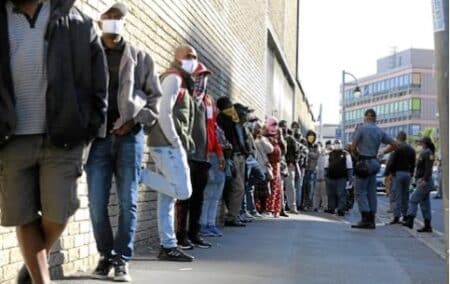Where is the evidence that the ANC’s goals have changed? To party elders, Zuma’s unforgivable sin was his electoral toxicity. Echoing past injustices, systemic patronage is being adorned with false legislative legitimacy.
South Africa’s path to sustained high growth will remain inaccessible in the absence of core policy reversals. Conversely, the style of the Ramaphosa-led ANC is to build consensus while only embracing change when not doing so threatens the party’s grip on power. If the 2024 poll doesn’t induce fundamental shifts, the entrenching of pervasive poverty will promote predatory politics, probably for decades.
The ANC’s redistribution-focused policies benefit favoured supporters while choking growth and condemning a majority of young South Africans to chronic poverty. If our ruling party can confidently maintain its majority through 2024, policy reforms will be egregiously insufficient, thus sinking the nation’s long-term prospects.
Our economy’s capacity to meaningfully employ each year’s crop of new jobseekers is astoundingly inadequate. We under-appreciate both the long-term implication and what is required to convert the absorption rate from 25% to 75%. Capable leaders with sound policies and practices would need twenty years.
Bulging unemployment, horrific education outcomes and widespread poverty reinforce one another. Debt costs overwhelming government and household finances further narrow the options. Our conditioned reflex is to advocate for investment-friendly policies. This is only half right. It is a holdover from an earlier era when mining opportunities could attract foreign capital which would trigger decades of export earnings.
Obvious errors
Today’s expectations for inward-bound investments unrealistically presume our domestic consumers can reward them at little cost to incumbents. Rather, our dangerously high unemployment not only reflects low domestic purchasing power relative to the size of the workforce; it has reached a critical mass which can’t be overcome through simply correcting the many obvious errors.
As today’s leading emerging nations demonstrate daily, broad prosperity requires adopting competitiveness-enhancing policies to grow exports. Only then can foreign investments, preferably those that bring competitiveness-enhancing knowledge and practices, be successfully solicited.
This is fully manageable commercially. The blockages are the destructive policies our ruling party has sold to its supporters as solutions.
The composition of both the global economy and South Africa’s electorate have changed radically since three decades ago. Most of our current voters are poor, with few skills and dismal prospects, while global trends now greatly favour services and digital possibilities over bending metal and burning hydrocarbons. Yet, as underskilled as South Africa’s workforce is, the more persistent impediment to reducing unemployment is the inward bias of our national policies.
The network is the computer; the world is the economy. This evolution has seen poverty plunge in all other regions. Accelerating science alongside increasingly adaptable companies makes it easy for human productivity to exceed subsistence levels. Know-how continually expands while becoming ever easier to diffuse. Just as famines have been mostly eliminated, pervasive poverty surrenders amid competent governance.
This region’s paucity of well-performing governments traces to traditions persisting from the agricultural era. Back then, nearly everyone lived within feudal or chiefdom structures which rigidly concentrated political and economic power around land ownership. Their stability reflected elites accumulating grain and livestock, which would often prove invaluable when harvests were insufficient.
Cascades of advancements
Industrialisation greatly enhanced farming productivity which in turn unleashed cascades of advancements beyond what anyone could have previously imagined.
Today’s global economy is a hundred times larger than it was two hundred years ago. There are nearly eight times more people who, on average, live twice as long and are more than ten times richer. It is not that the benefits have flowed disproportionately to the very wealthy. Poverty has plunged as a truly massive middle class has emerged.
A knack for taking credit enhances the popularity of politicians and their parties. Yet, as the pandemic reminds us, it is the scientists and business people who are more capable.
When rulers live sumptuously while most meekly live off the land or the state, this is completely at odds with the higher output of 21st century workers. Our government and economy both need overhauls. Injustices – recent, historic and ongoing – are secondary, yet they dominate our dialogues.
Fixing infrastructure and state-owned enterprises is important, as is tamping down corruption and attracting long-term foreign investments. Improving markedly in all of these areas would not, however, constitute a solution. For the percentage of working-age South Africans who will be unemployed twenty, or thirty, years from now to resemble that of a normal country, the ANC’s policy biases must soon be overcome.
Redistribution is inherently anti-growth
Focusing on redistribution is inherently anti-growth. It is also inherently isolationist which, given the dynamics of the global economy, is an option that even wealthy countries dare not entertain.
Our jailed former president strung together many meagre legal victories to buy much time. Even more than being a consensus builder, our current president seeks progress through small, gradual steps.
Minor successes will erode political pressure for the core policy reversals required to overcome rampant poverty through sustaining strong, export-led growth.
The views of the writer are not necessarily the views of the Daily Friend or the IRR
If you like what you have just read, support the Daily Friend


